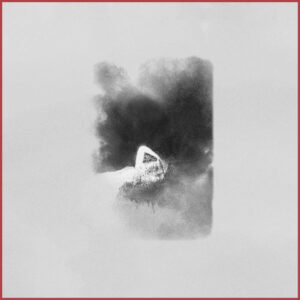Iskra

I first heard Olga Anna Markowska’s pieces this spring at mi-so, which is a small store and exhibition space that Erik Skodvin of miasmah recordings and his partner Monique Recknagel of the label sonic pieces started a few years ago here in Schöneberg where I have been living for the past 20 years. More recently they have been inviting friends and other musicians they find interesting to perform in their store for an audience of around 15 people.
Erik, or miasmah, now released Olga’s debut album, Iskra, which has a great record cover that doesn’t give away anything. The image is a photo by Olga, transformed into a kind of dream image by Erik who worked as a graphic designer for many years, designing also a huge amount of surreal album covers.
The concert was really fascinating, creating a unique atmosphere, and I could see everyone in the audience being very intrigued and moved by the sounds and energy Olga created with those instruments she brought. While she is first of all a cello player, then a visual artist working with photography and installations, she also uses some additional electronics, and she also bought a kind of zither on a flea market and then taught herself to play it – so it now takes a central role in the unique sound world of her album, opening up a kind of timeless, placeless kind of music. Her sound feels somewhere in a dreamlike, elusive space between acoustic and electronic.
It is very exciting to see how her music relates to her visual work, and it’s been quite inspiring to visit her website and wander through the photographic and installation works she documents there. For example, Iskra seems to communicate really well with the Borderland or 6 Years projects, maybe also some parts of Map of the Memory, all of which you can find on her website. I think Olga’s work invites us into a very personal sphere, and – even though she doesn’t show herself – we are trying to figure out where we can find her in there, and then also ourselves. I am also quite intrigued by how the work draws from specific places and then draws me towards them.
When I talked to Olga, she explained how she worked and lived with the music on this album for quite many years, and through different (even difficult) times of her life, including moving though different periods of her life, …moving from one Polish city to another and also to some residencies in other European countries. I quite loved how she struggled to categorize her music into a genre or style, and the influences or inspirations she mentioned can also be misleading when people cannot hear the music. I am listening to an album by Evgueni Galperine at this moment, Theory of Becoming, which to me feels grounded in a somewhat similar intangible sound world between electronic and acoustic (at least the LP’s A-side), between ancient and avant-garde, between eastern and western sensibility. Some people may think there’s not much to hear there, but then, when you let yourself fall into it, it opens up huge spaces.